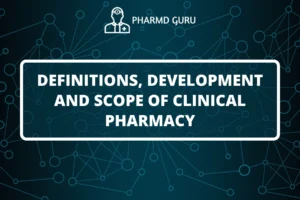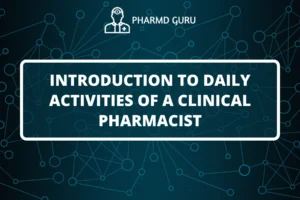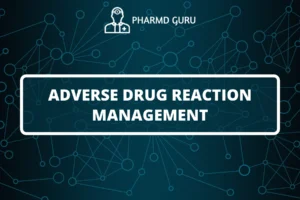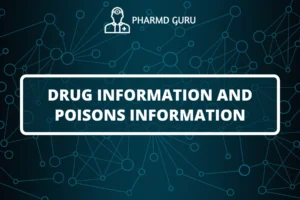Ward rounds are a crucial component of patient care in healthcare settings, allowing healthcare professionals to assess and manage patients’ conditions. Clinical pharmacists actively participate in ward rounds, bringing their expertise in medication management and ensuring optimal pharmaceutical care. In this article, we will explore the role of clinical pharmacists in ward round participation, highlighting the value they add to the healthcare team.
SCROLL DOWN TO THE BOTTOM OF THE PAGE FOR ACTUAL NOTES
TABLE OF CONTENTS:
- Introduction
- The Purpose of Ward Rounds
- The Role of Clinical Pharmacists
- Medication Review and Optimization
- Collaborative Decision-Making
- Drug Information and Recommendations
- Patient Education and Counseling
- Interprofessional Collaboration
- Enhanced Patient Safety
1. Introduction
Ward rounds are regular visits conducted by healthcare teams to assess and manage patients admitted to hospitals or other inpatient settings. These rounds involve various healthcare professionals, including physicians, nurses, and clinical pharmacists, who work together to ensure comprehensive patient care.
2. The Purpose of Ward Rounds
The primary purpose of ward rounds is to review and discuss patients’ conditions, treatments, and progress. They serve as an opportunity for healthcare professionals to evaluate the effectiveness of current treatment plans, make adjustments if needed, and ensure coordinated care across different disciplines.
3. The Role of Clinical Pharmacists
Clinical pharmacists play a vital role in ward round participation, focusing on medication-related aspects of patient care. Their expertise in pharmacotherapy, drug interactions, and medication management brings a unique perspective to the healthcare team.
4. Medication Review and Optimization
During ward rounds, clinical pharmacists conduct thorough medication reviews for each patient. They assess the appropriateness of prescribed medications, identify any potential drug interactions or adverse effects, and recommend necessary adjustments to optimize therapy. This process ensures that patients receive the most effective and safe medication regimens.
5. Collaborative Decision-Making
Clinical pharmacists actively engage in collaborative decision-making during ward rounds. They provide input and recommendations regarding medication choices, dosages, and therapeutic alternatives based on their expertise. By actively participating in discussions, clinical pharmacists contribute to patient-centered care and the development of well-informed treatment plans.
6. Drug Information and Recommendations
Clinical pharmacists serve as valuable sources of drug information during ward rounds. They provide up-to-date information on medications, including dosages, administration techniques, potential side effects, and drug interactions. Their recommendations help guide healthcare professionals in making informed decisions regarding patient care.
7. Patient Education and Counseling
In addition to their role in medication management, clinical pharmacists play a crucial part in patient education and counseling. They take the opportunity during ward rounds to communicate important information to patients, explaining the purpose and expected outcomes of their medications, potential side effects, and strategies for optimal medication adherence.
8. Interprofessional Collaboration
Ward rounds foster interprofessional collaboration, and clinical pharmacists actively engage with other healthcare professionals. They contribute their expertise on medication-related matters, participate in discussions about treatment plans, and exchange valuable information with the team members. This collaboration ensures coordinated care and improves patient outcomes.
9. Enhanced Patient Safety
The participation of clinical pharmacists in ward rounds significantly enhances patient safety. By conducting medication reviews, identifying medication-related problems, and making necessary interventions, clinical pharmacists help prevent medication errors, adverse drug events, and drug interactions. Their involvement in the decision-making process contributes to safer medication use and better patient outcomes.
ACTUAL NOTES




